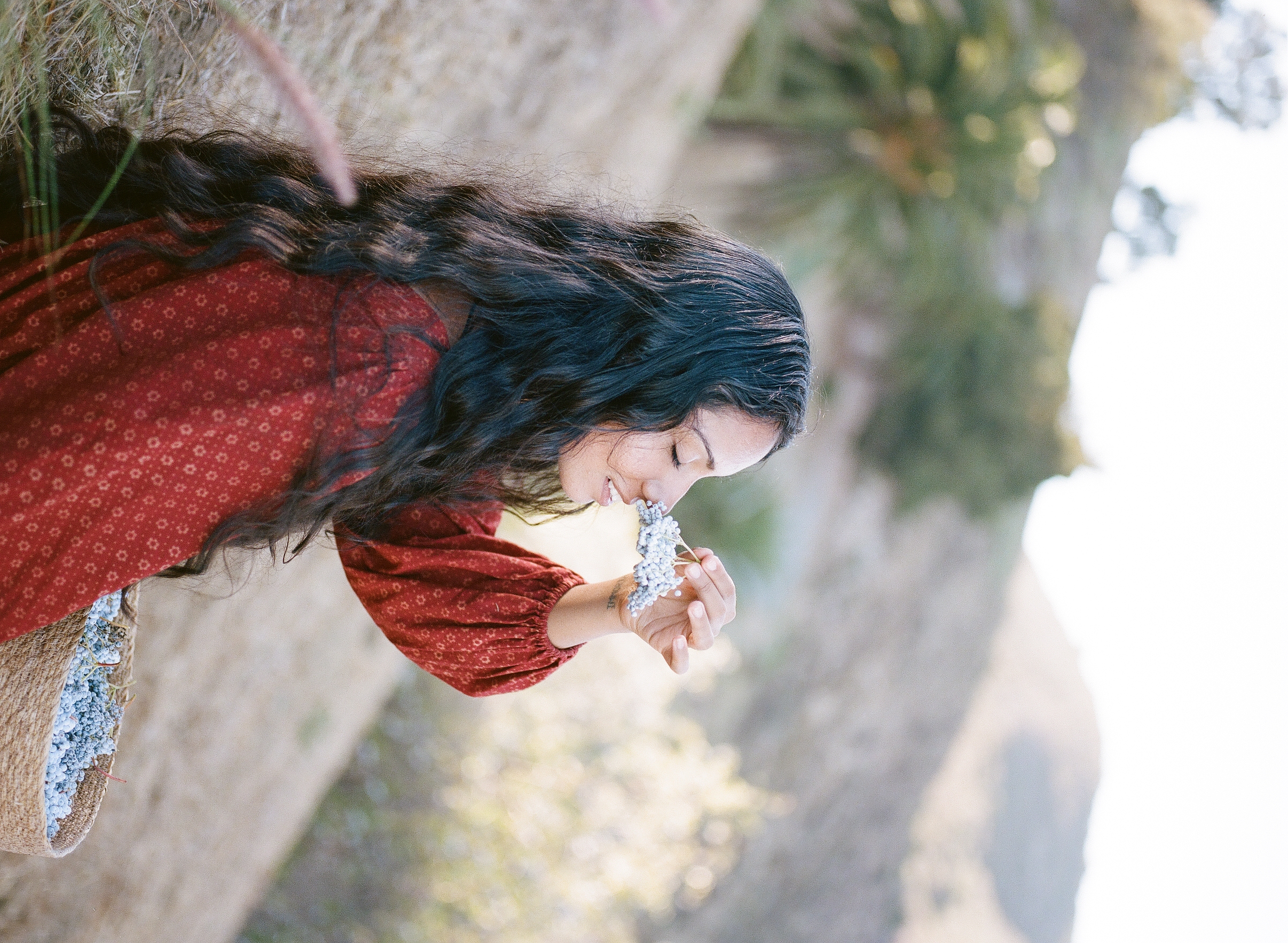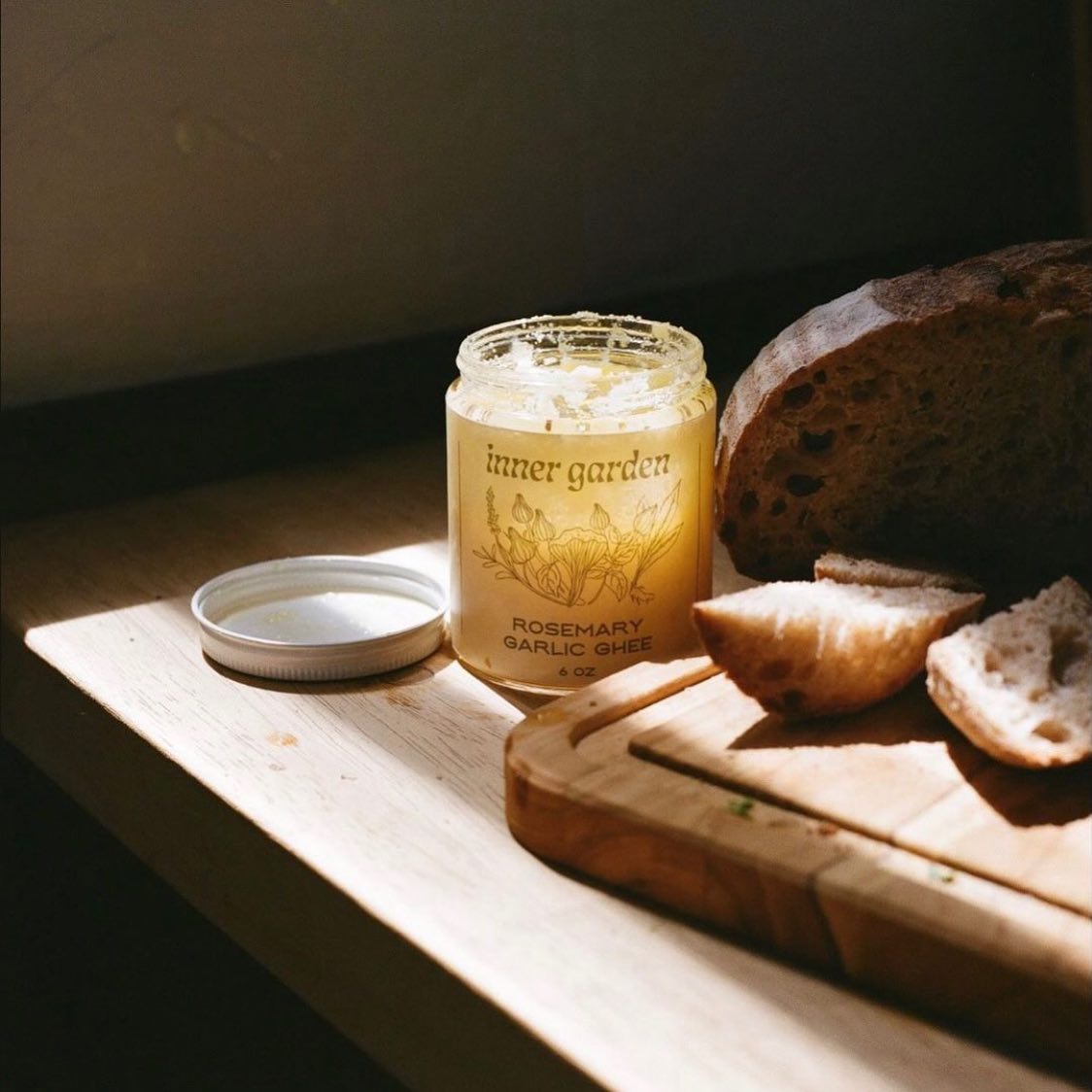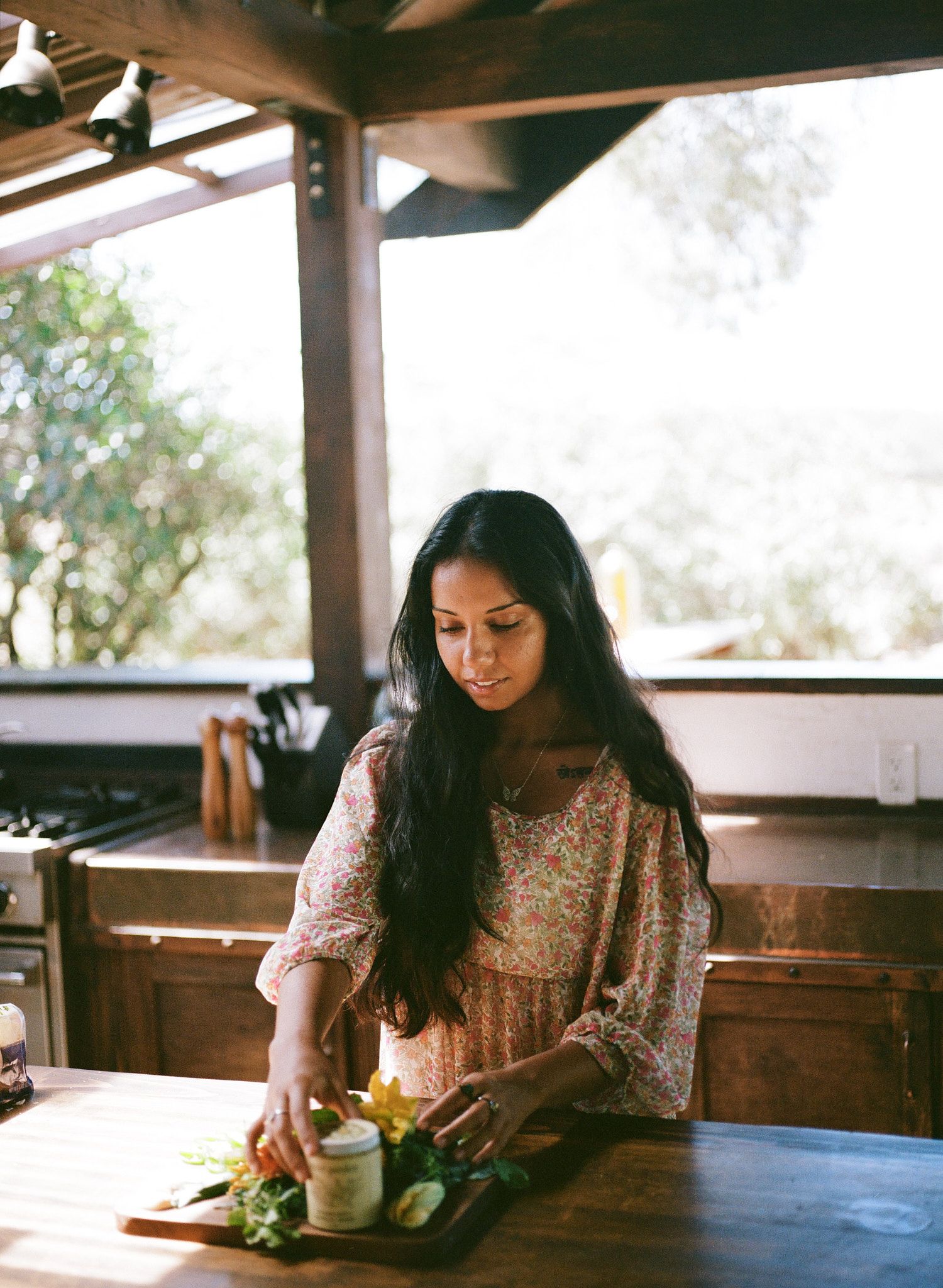Jaskrit Bhalla, Herbalist + Educator, Innergarden
Jaskrit is an herbalist, permaculture practitioner, naturalist, educator, and lover of food living in Southern California. Her mission is to inspire people to connect with and tend to their inner gardens through Earth, Body, and Spirit care.
Where are you based? Who are the indigenous peoples of this land?
I am based in Orange County, California. This land is unceded Tongva territory.
Can you share a bit about what ignited your herbalism journey?
I have always had a strong relationship with plants and nature, both of which were my greatest healing allies throughout difficult chapters of my life. I also grew up around what I like to call kitchen medicine: the use of herbs, spices, and medicinal foods in everyday life through what my mom cooked for my family. We are North Indian, so our traditional cuisine is rich in ingredients that support digestion and immunity. My grandfather was also a homeopathic practitioner and would provide remedies to members of his community that couldn’t afford healthcare or expensive medical treatments (to the best of his abilities).
I began studying herbal medicine more formally after working at an organic farm and learning about the importance of the ways our food, medicine, textiles, and dyes are grown. I became passionate about supporting local ecology and food systems, but wanted to delve deeper into the ethnobotanical history of Southern California. I found an herbal medicine apprenticeship program that focuses on not just herbalism but also field botany, stewardship, nutrition, and community.



Who are your ancestors? Do they influence your herbal practices?
My ancestors are from Northwestern India and Pakistan, or more specifically, the Punjab region of pre-partition India. I feel like the energetic system that resonates the most with me is Ayurveda, which informs much of my personal practice and the ways through which I see the world. I utilize lots of ancestral plant allies in my daily life including Tulsi, Ashwagandha, Turmeric, Shatavari, and all the culinary herbs/spices that originate from the Indian subcontinent. I also have a background in classical yoga, so I like to incorporate that into my practice.
How do you incorporate herbalism into your everyday life?
This is always a tricky question for me because I never really know where to begin! For me, going on a hike and sitting with my favorite native plants is just as much of a medicine as drinking an herbal infusion or taking a tincture. I spent a lot of time outdoors with native plants that I have deeply familiarized myself with and have immense respect for. I don’t wildcraft or forage frequently because Southern California is full of sensitive, threatened ecosystems and a vast history of Indigenous stewardship. However, I incorporate herbs into much of my daily life. I grow herbs in my backyard garden, drink nourishing herbal infusions every day, have a rotation of tinctures I take each morning, use digestive bitters, and incorporate herbs into lots of my cooking.
Lately I’ve been doing oat straw infusions every day. I’ll do nettle infusions for a couple weeks until I notice myself drying out a bit due to their dry energetics and diuretic effect that is exacerbated by the arid climate I live in. Then I’ll switch to another nutritive, mineralizing herb. I take a medicinal mushroom complex tincture, bee propolis tincture, and whatever else I feel like I need each morning with a glass of water.
The classes of herbs I use most frequently are relaxing nervines, adaptogens, nutritive herbs/alteratives, herbs for hormonal support, and carminatives (herbs that promote digestion). These are just targeted for my specific needs but everybody is different.
What’s your go-to plant preparation & why?
My go-to plant preparation is either an infusion, or powdered herbs incorporated into a fat like ghee or whole milk and then added to whatever I’m cooking. I find these to be the most accessible and enjoyable ways for me to stay consistent. I try my best to make sure I’m taking my herbs on a regular basis.
What are your tips for someone who is just starting?
Go outside and get to know the land you live on. Our relationship with the land is a reflection of our relationship with ourselves. Begin cultivating awareness of the things that grow around you, learn about their history of use, sit with them, observe them. Also, try growing windowsill herbs or herbs in your backyard if you have space! Herbs grow well in containers and are extremely easy plants to work with. Finally, find a couple of plants that you feel deeply called to explore and get to know them very well. It’s better to have a close relationship with a few plants than to overwhelm yourself with trying to learn everything there is to know about every medicinal plant in the world.
How do you cultivate reciprocity with plants?
If I do choose to wildcraft, I have a long checklist that my teacher provided all her students with to go through prior to harvesting anything. I always try to make an offering (ex: a bit of water) and then ask the plant if it is okay for me to harvest. I never harvest more than what I need, or from a plant stand that looks sparse or too young.
I have grown many culinary and medicinal plants in my backyard that I now have a closer relationship with because I worked with them throughout their life cycle. I try to remain humble and remind myself that these beings are far more intelligent than we as humans could ever try to intellectualize. I try to view plants as other beings that deserve our respect, love, and care regardless of what they can do for us humans.
What is your herbalism philosophy?
Herbalism is my way of connecting with land and the life force that permeates all beings on Earth. It’s stewardship and reciprocity. It’s medicine for the people.
Any exciting projects you’re working on?
I am currently working on lots of events that I have coming up this spring that I will share about on my website, newsletter, and Instagram. I am working on getting production back up and running for my line of grass-fed ghee (including 2 herbal recipes) and launching my online shop. Follow me on instagram to stay up to date on all upcoming projects!
![]()
![]()
![]()
![]()
Lightning︎Round
Favorite herb book: Energetic Herbalism by Kat Maier
Non-herb books: The Chalice and the Blade by Riane Eisler, In Defense of Food by Michael Pollan
Film: Anything with Winona Ryder in it
Song: This is SO hard. Maybe Rhiannon by Fleetwood Mac, or How to Fly by Sticky Fingers. Or anything by Wu-Tang Clan, A Tribe Called Quest, or Erykah Badu.
Artist: Any classical Indian art!
Destination: Either Hawaii (which I haven’t traveled to in years out of respect for the present situation), Greece, Italy, Peru, or Mexico. Or anywhere in California that has coniferous trees!
Tea:Tulsi tea
Herbalists who inspire you: Shana Lipner (Sage Country Herbs), Kelsey Barrett (Land of Verse)
Herbs that are always in your apothecary: Wild oats, nettles, tulsi, ashwagandha, dandelion, lemon balm, lavender, rose, schisandra, hibiscus, marshmallow root, turmeric, ginger, chamomile, reishi, lion’s mane
My ancestors are from Northwestern India and Pakistan, or more specifically, the Punjab region of pre-partition India. I feel like the energetic system that resonates the most with me is Ayurveda, which informs much of my personal practice and the ways through which I see the world. I utilize lots of ancestral plant allies in my daily life including Tulsi, Ashwagandha, Turmeric, Shatavari, and all the culinary herbs/spices that originate from the Indian subcontinent. I also have a background in classical yoga, so I like to incorporate that into my practice.
How do you incorporate herbalism into your everyday life?
This is always a tricky question for me because I never really know where to begin! For me, going on a hike and sitting with my favorite native plants is just as much of a medicine as drinking an herbal infusion or taking a tincture. I spent a lot of time outdoors with native plants that I have deeply familiarized myself with and have immense respect for. I don’t wildcraft or forage frequently because Southern California is full of sensitive, threatened ecosystems and a vast history of Indigenous stewardship. However, I incorporate herbs into much of my daily life. I grow herbs in my backyard garden, drink nourishing herbal infusions every day, have a rotation of tinctures I take each morning, use digestive bitters, and incorporate herbs into lots of my cooking.
Lately I’ve been doing oat straw infusions every day. I’ll do nettle infusions for a couple weeks until I notice myself drying out a bit due to their dry energetics and diuretic effect that is exacerbated by the arid climate I live in. Then I’ll switch to another nutritive, mineralizing herb. I take a medicinal mushroom complex tincture, bee propolis tincture, and whatever else I feel like I need each morning with a glass of water.
The classes of herbs I use most frequently are relaxing nervines, adaptogens, nutritive herbs/alteratives, herbs for hormonal support, and carminatives (herbs that promote digestion). These are just targeted for my specific needs but everybody is different.
What’s your go-to plant preparation & why?
My go-to plant preparation is either an infusion, or powdered herbs incorporated into a fat like ghee or whole milk and then added to whatever I’m cooking. I find these to be the most accessible and enjoyable ways for me to stay consistent. I try my best to make sure I’m taking my herbs on a regular basis.
What are your tips for someone who is just starting?
Go outside and get to know the land you live on. Our relationship with the land is a reflection of our relationship with ourselves. Begin cultivating awareness of the things that grow around you, learn about their history of use, sit with them, observe them. Also, try growing windowsill herbs or herbs in your backyard if you have space! Herbs grow well in containers and are extremely easy plants to work with. Finally, find a couple of plants that you feel deeply called to explore and get to know them very well. It’s better to have a close relationship with a few plants than to overwhelm yourself with trying to learn everything there is to know about every medicinal plant in the world.
How do you cultivate reciprocity with plants?
If I do choose to wildcraft, I have a long checklist that my teacher provided all her students with to go through prior to harvesting anything. I always try to make an offering (ex: a bit of water) and then ask the plant if it is okay for me to harvest. I never harvest more than what I need, or from a plant stand that looks sparse or too young.
I have grown many culinary and medicinal plants in my backyard that I now have a closer relationship with because I worked with them throughout their life cycle. I try to remain humble and remind myself that these beings are far more intelligent than we as humans could ever try to intellectualize. I try to view plants as other beings that deserve our respect, love, and care regardless of what they can do for us humans.
What is your herbalism philosophy?
Herbalism is my way of connecting with land and the life force that permeates all beings on Earth. It’s stewardship and reciprocity. It’s medicine for the people.
Any exciting projects you’re working on?
I am currently working on lots of events that I have coming up this spring that I will share about on my website, newsletter, and Instagram. I am working on getting production back up and running for my line of grass-fed ghee (including 2 herbal recipes) and launching my online shop. Follow me on instagram to stay up to date on all upcoming projects!


Lightning︎Round
Non-herb books: The Chalice and the Blade by Riane Eisler, In Defense of Food by Michael Pollan
Film: Anything with Winona Ryder in it
Song: This is SO hard. Maybe Rhiannon by Fleetwood Mac, or How to Fly by Sticky Fingers. Or anything by Wu-Tang Clan, A Tribe Called Quest, or Erykah Badu.
Artist: Any classical Indian art!
Destination: Either Hawaii (which I haven’t traveled to in years out of respect for the present situation), Greece, Italy, Peru, or Mexico. Or anywhere in California that has coniferous trees!
Tea:Tulsi tea
Herbalists who inspire you: Shana Lipner (Sage Country Herbs), Kelsey Barrett (Land of Verse)
Herbs that are always in your apothecary: Wild oats, nettles, tulsi, ashwagandha, dandelion, lemon balm, lavender, rose, schisandra, hibiscus, marshmallow root, turmeric, ginger, chamomile, reishi, lion’s mane
